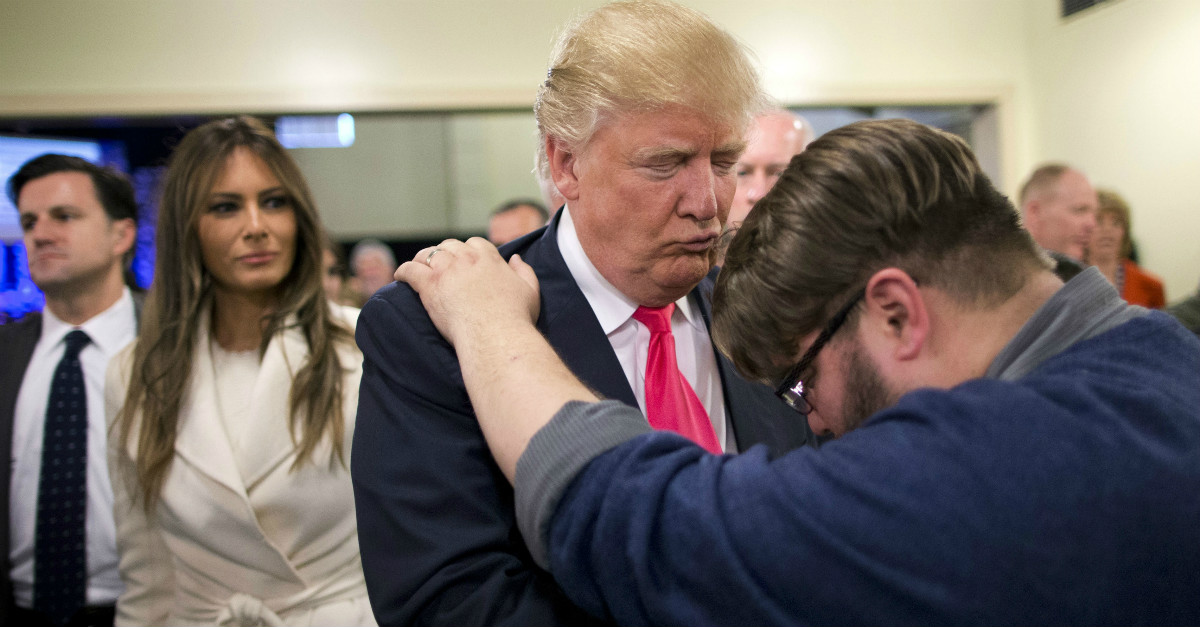“I even brought my Bible—the evangelicals, OK?” Donald Trump bragged at a rally shortly before the 2016 Iowa caucuses. “We love the evangelicals and we’re polling so well.” He waved the Bible around and added, “I really want to win Iowa—and again, the evangelicals, the Tea Party—we’re doing unbelievably, and I think I’m going to win Iowa.”
Videos by Rare
Trump didn’t win Iowa—he was narrowly pushed into second place by Ted Cruz—but he did win the presidency, and white evangelicals were instrumental in making that happen. In the general election, Trump snagged the support of four in five voters in that category. He could not have done it without them.
RELATED: By firing James Comey, Trump turned the bonfire that is the Russia inquiry into an inferno
Polling suggests this wasn’t all unbridled pro-Trump passion. In fact, a slim majority of these white evangelicals said they were more voting against Hillary Clinton than for Trump. Still, if it were just about Clinton, we’d expect to see more third-party protest votes from this crowd, and that didn’t happen.
Thus it is perhaps no surprise this demographic’s support for Trump is holding steady now that we’re passed the 100-day mark of his presidency: He’s lost just 3 percent support (putting him at 77 percent approval) among these evangelical voters even while posting embarrassingly low national approval numbers for months.
Trump shows no signs of reading his Bible, but he brought it, and that was apparently enough.
Writing at The Week recently, Gracy Olmstead proposed a historical analogy that helps make sense of Trump’s relationship with this major contingent of the American church. In Trump she sees a modern, largescale version of Tammany Hall, the infamous New York City political machine that ran on a complex system of patronage and sleaze.
If this fascinating slice of American political history is a bit fuzzy, I’ll allow Olmstead to give a refresher. “The Society of St. Tammany was a democratic political machine that served working-class immigrant voters, especially the Irish, and dominated New York City politics from the 1780s till the 1960s,” she explains. “Its leaders rewarded loyal voters with political appointments and financial perks.”
Of course, Olmstead adds, “Tammany Hall was hopelessly corrupt. Everyone knew it. But Tammany Hall also claimed to look out for the little guy — and often succeeded.”
The advantages and foibles of this political machine were dramatic enough on the local level, but Trump has taken it national. Olmstead primarily focuses on the main target of Trump’s proffered favoritism, blue-collar workers, and the crony capitalism that tends to produce, but I’d suggest white evangelicals are another of Trump’s Tammany constituencies.
Now, it’s clear Trump himself is not an evangelical. He has little apparent understanding of Christianity and no use for faith. He infamously said he has never felt a need to ask God for forgiveness, and, as Frank Bruni compellingly argued at The New York Times, typically comes off not as “someone interested in serving God” so much as “someone interested in being God.”
Nevertheless, Trump wants those evangelical votes, and in his political machine mindset, that means offering them his patronage. But unlike Tammany Hall, he doesn’t exactly deliver. Thus, for example, his religious liberty executive order from last week. This EO changed just about nothing—seriously, it’s so toothless the ACLU decided not to bother challenging it in court.
That Trump has done nothing of substance to enhance freedom of conscience protections hasn’t stopped evangelical leaders from singing his praises, because he continues to make them feel heard. Trump promised to “fight for” evangelicals, to look out for him the way Tammany Hall looked out for immigrants. That feeling of protection and access is enough for Liberty University’s Jerry Falwell Jr. to declare Trump the “dream president.”
RELATED: Ann Coulter tweeted that President Trump should be “head of church” — That’s Jesus’s job
To put my cards on the table, I was raised among the very white evangelicals who are now so enthusiastic about Trump. I do not share any of their enthusiasm because of the president’s policy and personal character alike.
And even though I understand why Trump’s Tammany-style promises appeal, I am disappointed and worried to see my fellow Christians putting their “trust in princes,” as Psalm 146 phrases it, “in human beings, who cannot save.”
Donald Trump is not savior of the American church, and it is troubling how many of my fellow Christians are so eager to rely on his (politically impotent) blessings. My own disagreement aside, it’s one thing to be a Christian who likes Trump’s policies. It’s another to make him the onus of your security, hope, and faith in a good future. For Christians, that seat should already be taken.



